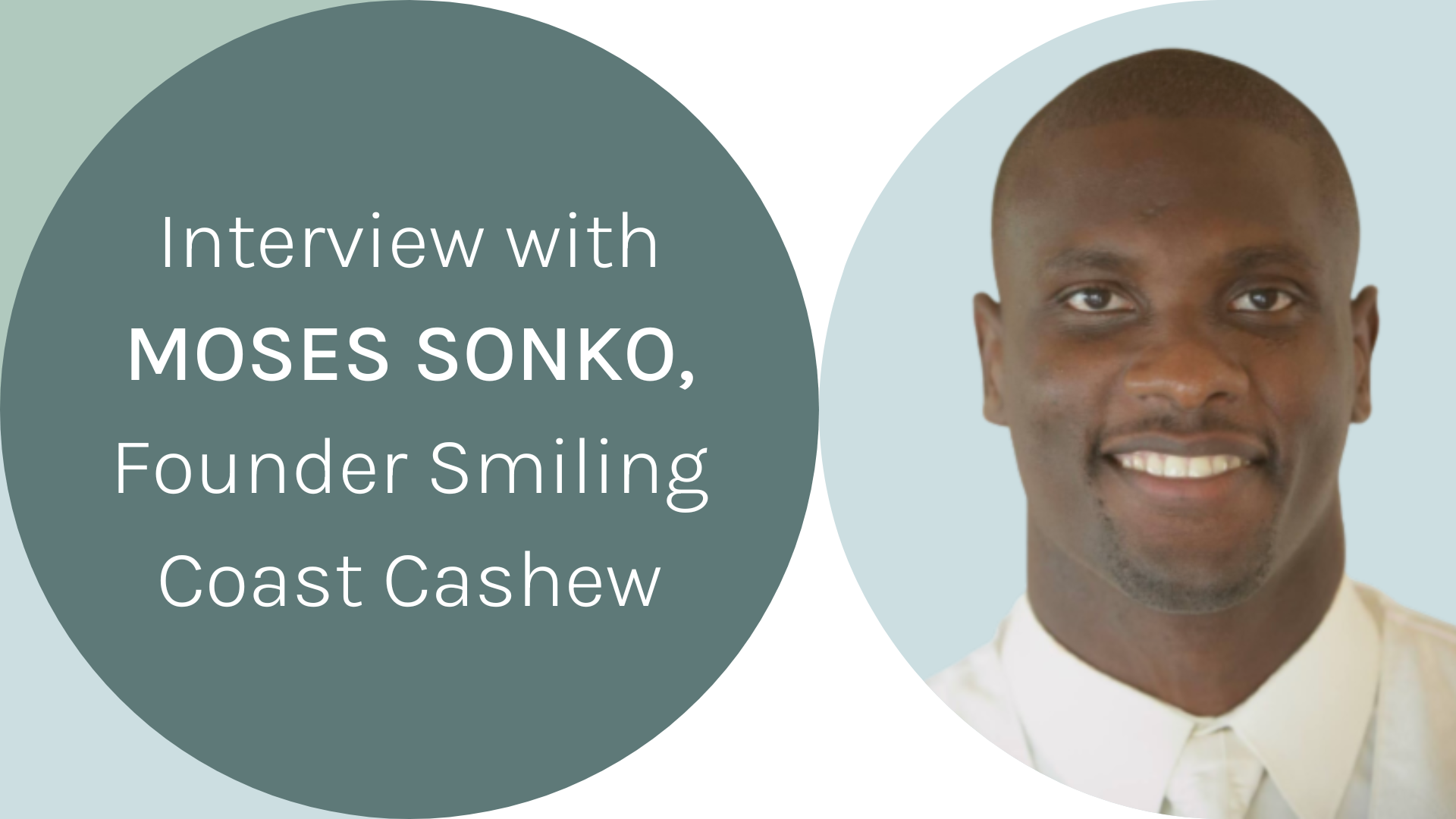- Starting Point
- Q: Looking back, what was SCAPC like when this project started?
- Q: What specific changes helped stabilise production?
- Q: SCAPC recently achieved HACCP certification. What does that mean for you and for The Gambia?
- Q: What are your next certification goals?
- Q: How did structured hiring become part of your execution discipline?
- Q: And when you applied it again, you found Fanta. How has she influenced the company?
- Q: What’s changed in how you manage people and operations since then?
- Q: What are your ambitions for the next two years?
- Q: What advice would you give other agribusiness entrepreneurs?
- Q: Final reflections on the consulting experience itself?
- About the Interviewees
- Acknowledgement
When Smiling Coast Agro Processing Company (SCAPC) was looking for expertise to help stabilise its young cashew factory, its promoter Moses Sonko was matched with P3rsist through the GIZ/MOVE project. The initiative — part of GIZ’s Business Development Services for small and medium agribusinesses — funded tailored technical and management support to help SCAPC strengthen its execution systems, governance, and certification readiness.
What followed became a forward-looking example of how development programmes can catalyse tangible business transformation: public funding that buys practical expertise, embeds capability, and leaves lasting value.
Within a year, SCAPC became The Gambia’s first HACCP-certified cashew processor, quadrupled production volumes, and drew investor attention — proof that targeted BDS support can drive both commercial success and development impact.

Starting Point
Before the partnership began, SCAPC was struggling to stabilise its operations. Production rarely reached one tonne per day, machinery downtime was frequent, and the small team operated without defined processes or performance tracking. As Moses puts it, “We were running on hope and energy, not systems.” That was the context when the GIZ/MOVE project matched SCAPC with P3rsist — a partnership designed to turn informal hustle into structured execution.
Q: Looking back, what was SCAPC like when this project started?
Moses Sonko: Our production was below 500 kg a day. We were running on hope and energy, not systems. Today we’re doing around two tonnes a day, will soon move to four, and have capacity for eight. Staffing grew from about twenty to fifty people, and we can go up to ninety as demand rises.
Leandro Bonvehi: Before, it was firefighting — pure survival mode. We reacted to problems instead of managing them. The turning point was bringing structure: daily meetings, defined accountabilities, and communication routines. That gave Moses the freedom to travel without things collapsing and allowed a smaller, tighter team to deliver more than the larger one we had before.
Q: What specific changes helped stabilise production?
Moses: Technical discipline first. We built a maintenance plan, fixed recurring issues like bearing failures, and started measuring yields properly. Before, we didn’t even realise how much loss came from poor yield control. We also began tracking key ratios, using daily meetings to address inefficiencies quickly, and training staff continuously.
Q: SCAPC recently achieved HACCP certification. What does that mean for you and for The Gambia?
Moses: It’s a huge step. We’re the first HACCP-certified cashew processor in The Gambia, and it changed how people see us. Our workers felt genuine pride. When the First Lady, the U.S. Ambassador, and the Turkish Ambassador visited, they realised they were part of something national. Government agencies now call us for input on food-safety training because, in some ways, we’re ahead of them. The authorities even added cashew to its priority export list because of our certification.
Leandro: For me it’s also about credibility. When I first visited, people had never heard of a food-safety recall; the concept didn’t exist. Now the mindset is shifting. You can’t build investor or buyer trust without food-safety discipline, and that’s what this certification signals.
Q: What are your next certification goals?
Moses: We’ve already applied to start the Organic process and plan to pursue BRC next. It’s not about collecting badges — it’s about continually raising standards and opening new markets.
Q: How did structured hiring become part of your execution discipline?
Moses: During a site visit with Harm we interviewed a candidate for Production Manager. On paper he was perfect — over ten years’ experience, HACCP background, the works. If we hadn’t used a structured interview process, I’d have hired him immediately. But as the questions went deeper, we saw red flags: entitlement, manipulation. A reference check confirmed it — he had previously rallied staff to strike during peak season and cost his former employer a fortune. That process saved us from a disaster.
Leandro: The structured interview felt unusual at first — almost repetitive — but I realised it’s designed to reveal patterns and inconsistencies. I later used the same approach in the U.S. tech firm I work for. We had a brilliant candidate, but the pattern didn’t hold up; he dodged accountability questions. The company hired him anyway. Within months, everything I’d flagged happened — conflict, trust erosion, termination. It proved to me that structured hiring works across sectors.
Q: And when you applied it again, you found Fanta. How has she influenced the company?
Moses: She’s been central to our certification. A go-getter, always thinking ahead, even bringing the First Lady to visit. Yes, she’s ambitious, but her success and ours are tied together. Even now, she’s working with the national food-safety authority on codex documentation — what she learned here is helping shape policy.
Leandro: The difference between her and the first candidate is simple: his growth would have hurt the company; hers helps it. For her to advance, SCAPC has to succeed — so she pushes in the right direction.
Q: What’s changed in how you manage people and operations since then?
Moses: Before, I looked only at skills — could they do the job? Now I look at behaviour and attitude. One person with the wrong behaviour can poison the culture. We’ve learned that it’s okay to set standards and let people go when they undermine them. The same applies on the technical side: we now make every decision on data. For example, when shelling splits increased, we used sample testing and machine logs to trace the issue. Replacing worn blades dropped breakage from 9 % to 5 % overnight. It’s a science — you can’t guess anymore.
Q: What are your ambitions for the next two years?
Moses: Our short-term goal is to reach four tonnes a day and begin exports. We’re already in discussions for shipments to Turkey and the EU. Longer-term, we want to reach 40 tonnes a day — national-scale processing. With Organic and BRC certifications coming, that feels achievable.
Leandro: Growth will test us. For the first time, demand may exceed what we can supply — that’s a good problem to have. But our systems will keep us steady when the pressure comes.
Q: What advice would you give other agribusiness entrepreneurs?
Moses: If you don’t build systems, you’ll spend money fixing the same problems over and over again. And find the right technical guidance early. If we’d had P3rsist from day one, we’d be years ahead.
Leandro: Expect mistakes; they’re part of learning. The key is to have someone experienced asking the right questions so your mistakes don’t become fatal ones. That’s what made the difference for us.
Q: Final reflections on the consulting experience itself?
Leandro: I’ve dealt with many consultants — usually box-ticking exercises. What stood out here was focus on outcomes, not deliverables. We weren’t handed a report; we were guided toward results.
Moses: Yes. We’ve had consultants before who literally asked us to fake documents for certification. This was the opposite: real discipline, real accountability, real impact.
About the Interviewees
Moses Sonko – Founder and Promoter of Smiling Coast Agro Processing Company, The Gambia’s first HACCP-certified cashew processor. A serial agribusiness entrepreneur, Moses leads the company’s drive toward food-safety excellence and export expansion.
Leandro Bonvehi – Investor and shareholder in SCAPC, based in the United States. With a background in technology, he provides strategic oversight and brings cross-sector insight to SCAPC’s governance and scaling.
Interview conducted by Harm Voortman, Founder of P3rsist. P3rsist partners with African agribusinesses to strengthen execution capability and scale growth sustainably. Ready to turn strategy into execution? Contact us to explore how.
Acknowledgement
This cooperation was made possible through the GIZ/MOVE programme, which supported P3rsist’s advisory work with SCAPC as part of its Business Development Services initiative for agribusinesses in West Africa.
GIZ/MOVE Business Development Services aim to strengthen cashew processing factories, enhance processing efficiency, product quality, and traceability for better market access, while also supporting factories in achieving HACCP and GFSI certifications. For more information click here: www.comcashew.org





